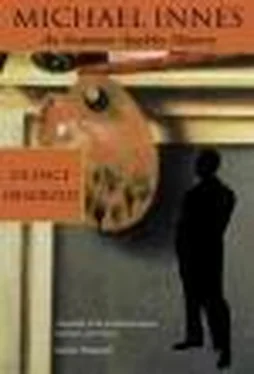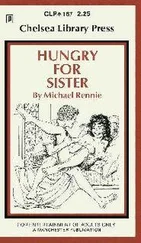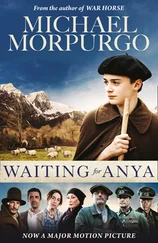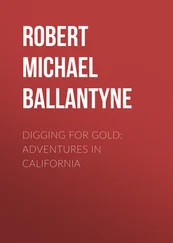Michael Innes - Lament for a Maker
Здесь есть возможность читать онлайн «Michael Innes - Lament for a Maker» весь текст электронной книги совершенно бесплатно (целиком полную версию без сокращений). В некоторых случаях можно слушать аудио, скачать через торрент в формате fb2 и присутствует краткое содержание. Жанр: Старинная литература, на английском языке. Описание произведения, (предисловие) а так же отзывы посетителей доступны на портале библиотеки ЛибКат.
- Название:Lament for a Maker
- Автор:
- Жанр:
- Год:неизвестен
- ISBN:нет данных
- Рейтинг книги:4 / 5. Голосов: 1
-
Избранное:Добавить в избранное
- Отзывы:
-
Ваша оценка:
- 80
- 1
- 2
- 3
- 4
- 5
Lament for a Maker: краткое содержание, описание и аннотация
Предлагаем к чтению аннотацию, описание, краткое содержание или предисловие (зависит от того, что написал сам автор книги «Lament for a Maker»). Если вы не нашли необходимую информацию о книге — напишите в комментариях, мы постараемся отыскать её.
Lament for a Maker — читать онлайн бесплатно полную книгу (весь текст) целиком
Ниже представлен текст книги, разбитый по страницам. Система сохранения места последней прочитанной страницы, позволяет с удобством читать онлайн бесплатно книгу «Lament for a Maker», без необходимости каждый раз заново искать на чём Вы остановились. Поставьте закладку, и сможете в любой момент перейти на страницу, на которой закончили чтение.
Интервал:
Закладка:
I returned to the moat and laboriously made the circuit of it. The final picture was perfectly clear: Gamley coming to the body from one quarter; Sybil, Hardcastle and myself from another; our all moving on a line to the house; Gamley making off as he had come. Perhaps my reconnaissance was wasted labour but it gave me a comforting sense of tidying up behind me.
Hardcastle was hovering at the end of the basement corridor; I think he may have been hopefully trying the door of the cellar – if his wife is a witch he himself is certainly a ghoul. And now he came up to me and said hoarsely: ‘It’s murder.’
‘That remains to be seen, Mr Hardcastle. Come upstairs.’
‘I tell you the tink-loon Lindsay’s mischieved and murdered him. Didn’t I tell the laird fient the good could come of traffic with one of that name? He’s mischieved and murdered him, and now he’s away with the quean.’
I had been tramping firmly in front of the brute; now I swung round on him. ‘What’s that you say?’
He gave an evil grin that might have signified ‘I’ve pricked you at last’; then, as once before, his dirty hand came from behind his back to stroke his chin. Incredible the slow, stupid malice with which he went on: ‘So you want to know?’
Whatever impertinent effect of suspense Hardcastle designed was marred at this moment by the outburst, just above our heads, of a quite spine-chilling howling and wailing. A hard fought battle between wolves and hyenas might, I fancied, have produced a somewhat similar impression; it was a few seconds before I realized that I was hearing at last Erchany’s lament for Ranald Guthrie – a lament which was about two-fifths Mrs Hardcastle, two-fifths the moron odd-boy, and one-fifth dogs in the background. Its composition changed as we reached the stair head, Tammas – the odd boy – sinking his ululations to a whimper and Mrs Hardcastle achieving something like articulate speech. Sybil was standing between them, looking so determinedly cool and severe that I suspected the night’s events were really beginning to get on top of her at last.
‘Woe the day, woe the day! The good laird’s deed, the good laird’s dead, and the lassie’s away with a Lindsay!’
Oddly and movingly, the old lady chanted her woes in rhythm. And grotesquely Tammas, swayed by the singsong of her voice, began to mumble verses of his own:
‘The craw kill’t the pussy-oh,
The craw kill’t the pussy-oh…’
It was an uncanny dirge. But I have had my bellyful of the uncanny of late, and I thumped upon an old baize door beside me like a chairman calling a rowdy meeting to order. Presently Tammas subsided into mere whisperings and Mrs Hardcastle, after an unpromising excursus on rats, fell into a vein of simple sense. What light I got on the situation in the next fifteen minutes I had better compress into a few sentences.
Neil Lindsay, the lad who thrust past us at that dramatic moment on the staircase, is, as I guessed, Christine’s lover – and whose suit Guthrie was absolutely opposed to. He is of crofter folk – tenants of a very small farm – in a neighbouring glen; and this social disparity is complicated, according to the Hardcastles, by some species of hereditary feud – I suppose that in these parts such a picturesque absurdity is still possible. There has been tension for some time and recently Lindsay has been coming about the castle at night in a threatening way. Neither Guthrie nor Christine had said anything about the inwardness of the matter, so the Hardcastles are somewhat in the dark. But Hardcastle professes to believe that Guthrie had decided to buy Lindsay off, and that it was for this purpose that he had been ordered to send the young man up to the tower upon his next appearance.
Lindsay came shortly before half-past eleven, was admitted by Hardcastle and sent straight up to the tower. Shortly before midnight Guthrie rang a bell – he seems to have had both the Hardcastles at his beck and call – and when Hardcastle mounted the stair shouted down to him the message about the nightcap which eventually brought me on the scene.
It was at this point that I really had to interrupt. ‘But Mr Hardcastle, can you explain why I should be summoned to celebrate this painful business of buying off the young man Lindsay? Wasn’t it rather a private affair?’
‘By your leave, Mr Gylby, I’m thinking the business would maybe be over and the bit dram with a stranger a way of getting the unchancy loon quietly away.’
I need hardly tell you there was scarcely a word of this story that I was in the least anxious to believe. In estimating its credibility, however, I have to remind myself sharply that on Hardcastle’s lips the multiplication table would soon become, as far as I am concerned, suspect at once. And now he was a less prepossessing figure than ever: his surliness was uncomfortably laced with servility and I was aware that he was intensely uneasy. I had contrived to get part of the narrative from his wife and I think he may have been in terror lest she should say the wrong thing – let the wrong species of sinister cat out of the bag. Or he may simply have been scared of me. Or of Sybil.
One fact has emerged clearly. Lindsay and Christine – unless they have been conveyed to some hidden dungeon of the castle – really have gone away, singly or together. Mrs Hardcastle, whom I am increasingly inclined to believe an honest woman, professes to have seen Christine running down the schoolroom corridor with a suitcase, and a hunt by lantern light at the main door of the castle has revealed two half-obliterated tracks leading off into the darkness. The elopement, I believe, is a fact – and a strange season they chose and a hard trek they’ve had. Lindsay when we met him on the staircase must have been making straight for Christine; a few minutes later they must have departed. But what had happened in the few minutes preceding? What happened in the tower?
On one of these questions Sybil was a witness. She had been – and quite mysteriously – in the room from which Guthrie had gone to his death. But so far she had been all but mum and I was reluctant in the presence of the Hardcastles to embark on what might appear an interrogation. Hardcastle himself, I could see, was consumed with curiosity about Sybil, and this alone would have inclined me to hold off. But in addition I thought I read an appeal or warning in Sybil’s eye, as if she would tell me that before pressing further a private conference would be best.
Another problem came into my head. I turned to Hardcastle and asked as abruptly as I could contrive: ‘Did your doctor ever come?’
It was a hit. Had I clapped on an executioner’s mask and incontinently invited him to lay his head on the block the horrid creature could not have been more taken aback. I have a fancy that a criminal lawyer could have got a lot from him in that moment – a moment in which he was floundering out of his depth. He didn’t know what it was I knew. And it must be confessed that, like a fool, I promptly told him.
‘You called out to ask if it was the doctor, you know, when you opened the door to Miss Guthrie and me.’
‘And didn’t you know, Mr Gylby, that one of the dogs is called Doctor, and that I was but thinking he’d got loose?’
I was rather taken aback myself this time by so neat, if evident, a lie. The fellow possesses the cunning that his face claims for him and for the moment I gave him best. It occurred to me to attempt some sort of communication with Tammas – who was to be our first link, it seemed, with the world.
‘Do you think,’ I said, ‘that you can get down to Kinkeig?’ Tammas, realizing that he was addressed, blushed in the uncertain lamplight like a girl. And then he murmured softly:
‘There’s nae luck aboot the hoose,
Читать дальшеИнтервал:
Закладка:
Похожие книги на «Lament for a Maker»
Представляем Вашему вниманию похожие книги на «Lament for a Maker» списком для выбора. Мы отобрали схожую по названию и смыслу литературу в надежде предоставить читателям больше вариантов отыскать новые, интересные, ещё непрочитанные произведения.
Обсуждение, отзывы о книге «Lament for a Maker» и просто собственные мнения читателей. Оставьте ваши комментарии, напишите, что Вы думаете о произведении, его смысле или главных героях. Укажите что конкретно понравилось, а что нет, и почему Вы так считаете.











